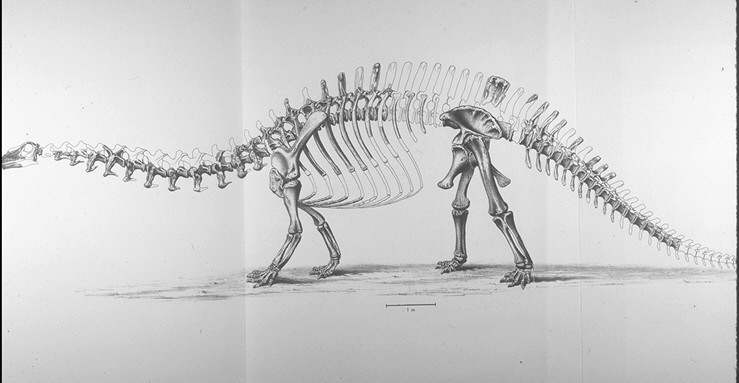|
Brontosaurus - Wiki

| 해상도: 739x383
파일크기: 60406 Bytes
등록시간: 2006:12:26 10:14:20
|
Brontosaurus
From Wikipedia, the free encyclopedia
[Photo] Brontosaurus skeleton by Othniel C. Marsh. Illustration of Brontosaurus skeleton by Othniel Charles Marsh (d. 1899). http://en.wikipedia.org/wiki/Othniel_Charles_Marsh
Brontosaurus (pronounced /??b????n.t????s??ː.????s/), meaning "thunder lizard" (from the Greek bront??/βροντη meaning 'thunder' and sauros/σαυρο?? meaning 'lizard'), is a deprecated genus of sauropod dinosaurs. The Brontosaurus was misidentified by its discoverer Othniel Charles Marsh, in 1879 and the designation persisted as an official term in the general public's literature until at least 1974.
The terms brontosaurus, brontosaurs and brontosaurians (no capital 'B'; no italics) are often used to refer to an infraorder of sauropods including genera such as Brachiosaurus, Camarasaurus, Diplodocus and Supersaurus, as well as Apatosaurus.
History
Othniel Marsh, a Professor of Paleontology at Yale University who described and named an incomplete (and juvenile) skeleton of Apatosaurus ajax in 1877, two years later announced the discovery of a far larger and more complete specimen at Como Bluff Wyoming ??? which, because of discrepancies including the size difference, Marsh incorrectly identified as belonging to an entirely new genus and dubbed Brontosaurus excelsus. [Etymology: from Latin excelsus, "to exceed in number", suggesting the greater number of vertebrae in the sacrum than in any other genus of sauropod then known.]
To perfect the find ??? the largest dinosaur ever discovered at the time and nearly complete, lacking only a head, feet, and portions of the tail ??? for what was to be the first ever display of a sauropod skeleton, at Yale's Peabody Museum in 1905, some feet that were discovered at the same quarry were added, as well as a tail fashioned to appear as Marsh believed it should and what he apparently felt was the "correct" skull for the massive creature. This was not a delicate Diplodocus-style skull, matching what was actually a large Apatosaurus skeleton but, instead, a chimaera composed of "the biggest, thickest, strongest skull bones, lower jaws and tooth crowns from three different quarries", primarily those of Camarasaurus. (This "scientific sloppiness" is considered to be symptomatic of undue haste resulting from Marsh's notorious rivalry with Edward Drinker Cope, which would later become known as the "Bone Wars".) There is, however, some debate on whether Marsh was actually involved in this patchwork skeleton or whether it was other Yale professors, as he has been reported to have died in 1899, six years before the display apparently took shape.
In 1903 Elmer Riggs published a paper in Geological Series of the Field Columbian Museum which identified B. excelsus as an Apatosaur (ie. A. excelsus):
...In view of these facts the two genera may be regarded as synonymous. As the term "Apatosaurus" has priority, "Brontosaurus" will be regarded as a synonym.
Nevertheless, the mistake was perpetuated by conservative paleontologists and museum curators (who would in fact reverse a number of corrective identifications of Apatosaurus skulls over the years) until it was officially laid to rest in 1975 with the publication of a paper by John S. (“Jack”) McIntosh and David S. Bermanbase, based on twenty years of research review.
Despite this some paleontologists ??? most notably Robert Bakker ??? argue that A. ajax and A. excelsus are in fact sufficiently distinct that the latter continues to merit a separate genus. Bakker recently re-classified A. yahnahpin as the type-species for the new genus Eobrontosaurus.
Differences from Apatosaurus
Apart from its fabricated skull, it is notable that the ponderous Brontosaur's traditional, semi-aquatic lifestyle is no longer believed to have resembled that of the real-world Apatosaurs. No Apatosaurus skeleton has been found in an ancient body of water, nor were its feet suited to walking through marshy and muddy ground. In fact, recent evidence [1] suggests that most sauropods actively avoided swampy terrain. Additionally, the gracile-skulled Apatosaurs, lacking the peg-like teeth of the bronto, almost certainly used a gizzard to enrich their diets sufficiently to allow them to move rapidly in herds, use their flexible tails in battle and perhaps even to rear up on their hind legs to reach vegetation or to mate.
Popular culture
The length of time taken for Marsh's misidentification to be brought to public notice meant that the Brontosaurus became one of the most famous of the dinosaurs, despite never having lived. In fact, "Brontosaurus" often appears as a synonym for "dinosaur" itself.
As late as 1989, the U.S. Post Office issued four dinosaur stamps, Tyrannosaurus, Stegosaurus, Pteradon and Brontosaurus, for which it was accused, amongst other things, of "fostering scientific illiteracy." The Post Office defended itself (in Postal Bulletin 21744) thus:
Although now recognized by the scientific community as Apatosaurus, the name "Brontosaurus" was used for the stamp because it is more familiar to the general population.
Stephen Jay Gould supports this position in his essay "Bully for Brontosaurus", echoing Riggs' original argument that "Brontosaurus" is merely a synonym for "Apatosaurus". Nevertheless, the heavy-headed creature has developed and continues to maintain an independent existence in the popular imagination. For a list of examples, see Brontosaurus in popular culture.
http://en.wikipedia.org/wiki/Brontosaurus
| The text in this page is based on the copyrighted Wikipedia article shown in above URL. It is used under the GNU Free Documentation License. You may redistribute it, verbatim or modified, providing that you comply with the terms of the GFDL. |
^o^
동물그림창고 똑똑전화 누리집
^o^
|
|
|